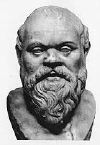
|
|
|
|

Little is known about the life of Socrates, because we have nothing of his writings. Plato's and Xenophon's writings are the source for information about Socrates' life and personality. Plato and Xenophon were about forty years younger than Socrates, so they only knew him during his last ten years of his life. Socrates father was a sculptor and his mother a midwife. Socrates married Xanthippe late in his life and they had three sons. In 399, Anytus indicted Socrates for impiety. The two charges were corrupting the youth and neglecting the gods. They convicted Socrates and condemned to death. His friend Crito devised an escape plan, but Socrates chose not to leave, because a legitimate court made the ruling and being a good citizen he must obey the law. (Source: philosophypages.com)
Plato's ApologyPlato's Apology of Socrates is a dialogue, about the trial of Socrates, in which Socrates answers the charges of his accusers with a short history of his life and morals. Socrates is adressing the charge that he is corrupting the youth when he says, "Those things I do not know, I do not think I know." Socrates is explaing that the young men copy his method of questioning people, because it shows people that there is always more to learn. (English text of Apology from Page by Page Books)
P. O'Sullivan, St. Paul's School, 2003